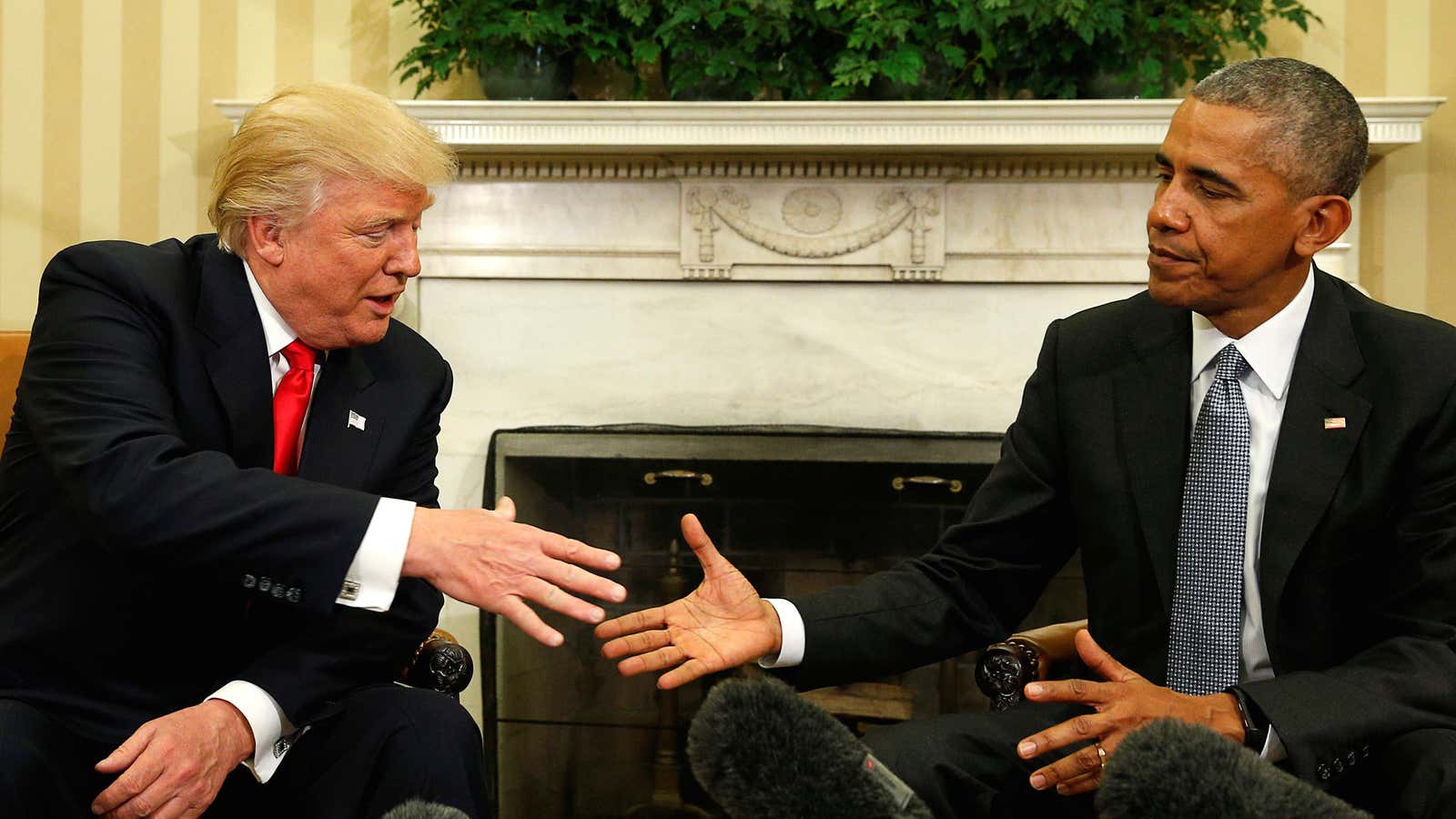Twice in this publication I warned of the “fat” (January 2016) and “fatter” (post-Brexit) tail risk of a Donald Trump presidency. I also identified white Americans’ social and economic anxieties as the driving force behind Trump’s rise. Against nearly all expectations, this “low probability, high impact’” event has now materialized. Trump is US president-elect, and now the world will have to figure out what that means. Here are some of the core political and geopolitical risks on the horizon:
Policy uncertainty
Whether you love or hate Trump’s policy proposals on trade, immigration, healthcare, infrastructure, and the like, an immediate risk of the pending Trump presidency is policy uncertainty. While Trump has won the presidency and will serve alongside a Republican-controlled Congress, his failure to win the popular vote and his division of Republican elites with his outsider, anti-establishment campaign call his mandate into question. Most of his plans are thin on detail, and the feasibility and legality of his more unorthodox policy proposals—i.e. building a wall on the Mexican border, deporting millions of undocumented immigrants, revitalizing coal and steel in the US, and scrapping existing trade deals—are uncertain at best, even if he did have full GOP support.
Trump’s ostensibly business-friendly plans to repeal Obamacare and his slash-and-burn approach to taxes are probably the most likely to move forward, but details on new health care policies are few and far between. While it is difficult to gauge which of Trump’s slew of nationalist trade threats will materialize as policy, that very uncertainty could disrupt trade with American’s main partners, especially Mexico and possibly China. To top it all off, Trump has routinely attacked the institutional role and policy agenda of the Federal Reserve, calling into question the status quo on US monetary policy.
Relationships abroad
Trump’s aggressively protectionist trade policies, loose talk about the use of force (including nuclear weapons), and vocal challenges to the utility of longstanding US alliances in the north Atlantic and east Asia have already unsettled US international relations. Unless he dramatically changes his tune, Trump’s foreign policy directives will almost certainly increase geopolitical instabilities across the board.
More directly, his threat to “get tough” on Chinese currency manipulation with the imposition of retaliatory tariffs will not be looked kindly upon by Beijing. Neither, for that matter, will Trump’s promised buildup of the US military. Trump’s implicit alliance with Vladimir Putin’s Russia may lend greater stability on that front. But again, the path to greater cooperation with an authoritarian, otherwise anti-American regime like Russia is rife with pitfalls, not least because Trump is opposed to the Iran nuclear deal clearly backed by the Russians. On that front, the future of American engagement in the Middle East is extremely hard to decipher, except to say that military and diplomatic policies will likely be more volatile and unpredictable.
American institutional stability
Donald Trump arguably ran the first anti-democratic presidential campaign in modern American history. He questioned the legitimacy of well-established electoral institutions, advocated for restricting basic civil liberties and banning immigrants based on a religious tests, expressed admiration for the authoritarian leaders like Putin and Saddam Hussein, encouraged nativism and white ethno-nationalism, threatened to jail his opponent if elected, and declared that “I alone can fix” the country in accepting his nomination for president. At the same time, he has scoffed at the prospect of paying taxes and attacked the mandate of the Federal Reserve.
America’s strong institutions—especially constitutionally-entrenched separation of powers and a robust rule of law—will help keep Trump’s authoritarian tendencies in check. But the inescapable conclusion is that these institutions (and thus American democracy) are under new and unprecedented stress. More prosaically, even a tax revolt becomes more likely under Trump, if only at the margins.
Social polarization
Trump won the presidency amidst, and at least in part because of, a significant increase in social polarization and instability in the US. Despite his relatively gracious victory speech in the early hours of Wednesday morning, the thus-far flame-throwing Trump’s ability to narrow the country’s growing ethnic, economic, political and rural-urban divides will most likely prove lacking. Law enforcement agencies may well feel empowered to use more aggressive tactics in bringing “law and order” to American cities, exacerbating social divides and raising the risk of more violent clashes between the state and its citizens. Aggressive fringe groups may also be emboldened, fueling the fire of social risk.
